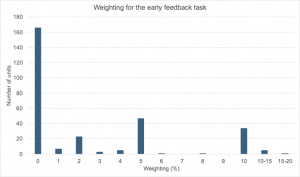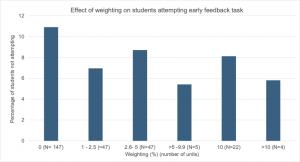Response to the legislative changes to the Higher Education Support Amendment Bill 2023 in Semester 1
As reported previously in Teaching@Sydney, the new requirements from the Commonwealth’s amendments to the Higher Education Support Act (HESA) came into effect on 1 January 2024. In response, the University published a new ‘Support for Students Policy’ on the 18th December 2023 – the first university to do so. The legislation requires us to have “processes for identifying students at risk of not successfully completing their units of study and supports available to students to successfully complete their studies”. Our Policy aims to improve academic and non-academic support for students at risk of not completing units and incorporates changes to teaching and learning methods including early feedback tasks, proactive student communication, and engagement with students potentially at risk before the census date.
Pre-census indicators and support
To date, the focus has been on introducing a number of pre-census indicators, to identify students who may be at risk of not successfully completing 1000-level units of study (Table 1). Students who triggered a pre-census indicator were proactively offered academic and non-academic support services prior to census, via the Student Portal. The latter includes new options for students to have one-on-one consultations with educators from their units. A new booking process and student interaction record for these consultations enables referral to other support services such as academic support, health and wellbeing.
Early feedback task
As detailed in a recent article Supporting students through pre-census assessment and feedback, early assessment and feedback increases student engagement and belonging, and enables educators to intervene and provide targeted supported. Early, low stakes assessment and feedback helps students adjust their study strategies and improve their performance. It is particularly important for commencing and equity students as it fosters engagement and understanding of their capability and the expectations and standards of their educators.
Personalised communications
Each student enrolled in a 1000-level unit received a “Welcome” email at the start of the teaching session. In addition, students triggering a pre-census indicator were sent further messages from their coordinators personalised to their situation. These personalised emails were sent by coordinators to using the Student Engagement Relationship Systems (SRES), a powerful communication tool, built at Sydney by and for educators. SRES is particularly useful for personalising learning support in large units.
Coordinators were provided with pre-configured SRES email filters and text, which could be personalised if desired. As a pilot, students in a small number of high enrolment units were also sent accompanying SMS text messages for the early feedback task indicator in week 4.
Table 1: Pre-census indicators for Semester 1 units. Similar indicators have been used for units running in intensive sessions.
| Week | Pre-census indicator | ‘At risk’ classification |
| 2 | Canvas engagement | Not logged into Canvas by 5pm Wednesday of Week 2 |
| 2 | Late enrolment | Student enrols between Canvas engagement trigger and “last day to add” (LDA) deadline (i.e. between 5pm Wednesday and 5pm Friday of Week 2) |
| 4 | Early feedback task (undertaken in Week 3; results released in Week 4) | Unsatisfactory performance or no attempt of early feedback task |
Student Portal and student appointments
Although the primary form of communication has been email, students are encouraged to interact with services and support options via the Student Portal. Alongside reducing email traffic, the use of the Portal enables tracking of which options individual students pick for internal improvement and external reporting. So far, more than 3200 students have interacted with the Portal. Around 38% of students selected multiple options and the most popular support selection has been the Learning Hub which has seen a significant increase in bookings.
The Portal now also includes options for students to have one-to-one consultations with educators from their units. Uptake of the booking system by students has been low so far.
Changes to unit outlines and Canvas
Since the start of the year, a link to the new Support for Students Policy, an explanation of its purpose and links to appropriate support have been added to the ‘Learning Support’ section of every unit outline. For 1000-level units, additional text explaining the early feedback task has been added to the ‘Assessment’ section of their outlines. An ‘early feedback task’ assignment group has been added to the Canvas site for every 1000-level unit. This enables completions to be tracked for the student communications as well as for reporting.
Semester 1 pilot
Thanks to the huge efforts of all involved, the Semester 1 2024 pilot has been very successful – being designed and implemented at a rapid pace and involving partnerships across the institution. Key engagement and support highlights from Semester 1 include:
- Each student (more than 27,000 unique students) enrolled in a 1000-level Unit of Study received a ‘Welcome Email’ that detailed support options, increasing awareness of how and where to seek support.
- Around 1/3 of students enrolled in a 1000-level unit of study received one or more email as a result of the indicators in Table 1. Around 60% of students opened emails they received.
- Around 1/2 of the students who triggered the Canvas engagement indicator did not go on to trigger the early feedback task indicator (meaning they went on to perform satisfactorily or withdrew from the unit).
- Of the students that received emails, over 1/5 engaged with support services.
Analysis is now underway of the effect of these interventions on student enrolment patterns and outcomes. The latter will not be possible until Semester 1 results are completed. Some preliminary insights include:
- Just under 20% of students did not attempt the early feedback task with about 1/4 of these students repeating this across more than one unit.
- However only about 1/10 of students who completed the early feedback task unsatisfactorily did so in another unit.
- Students who had unsatisfactory early feedback task attempts were more likely to engage with the email, including going to the Portal.
- Units with zero weighted early feedback tasks had the highest percentage of students not attempting them (see Figure 2) but the size of non-zero weighting appears to have little effect.
Next steps – Semester 2 workshops now available
Alongside further analysis of the impact of the interventions, staff and student c0-design sessions are currently underway to improve the process and communications. With these improvements implemented, the approach in Semester 2 will be broadly similar with all 1000-level units again introducing early feedback tasks and sending communications.
Information sessions for Semester 2 coordinators are now available. Coordinators may also be interested in the workshop on creating multiple choice questions for use as early feedback tasks with the aid of AI.
Tell me more!
- Higher Education Support Amendment – intranet page on the new legislation and the University of Sydney’s response.
- Putting support for students at the centre through earlyassessment feedback and personalised communications.
- Supporting students through pre-census assessment and feedback – review of the literature of early feedback and examples of suitable assessments from across the disciplines.
- Marking and feedback of early feedback tasks (EFT) – advice on how to provide meaningful feedback and links to associated literature
- Personalising learning support in large units using SRES – information on how to use SRES to personalise communications.
- Read the updated Coursework Policy and Assessment Procedures and the new Support for Students Policy on the Policy Register.








1 Comment